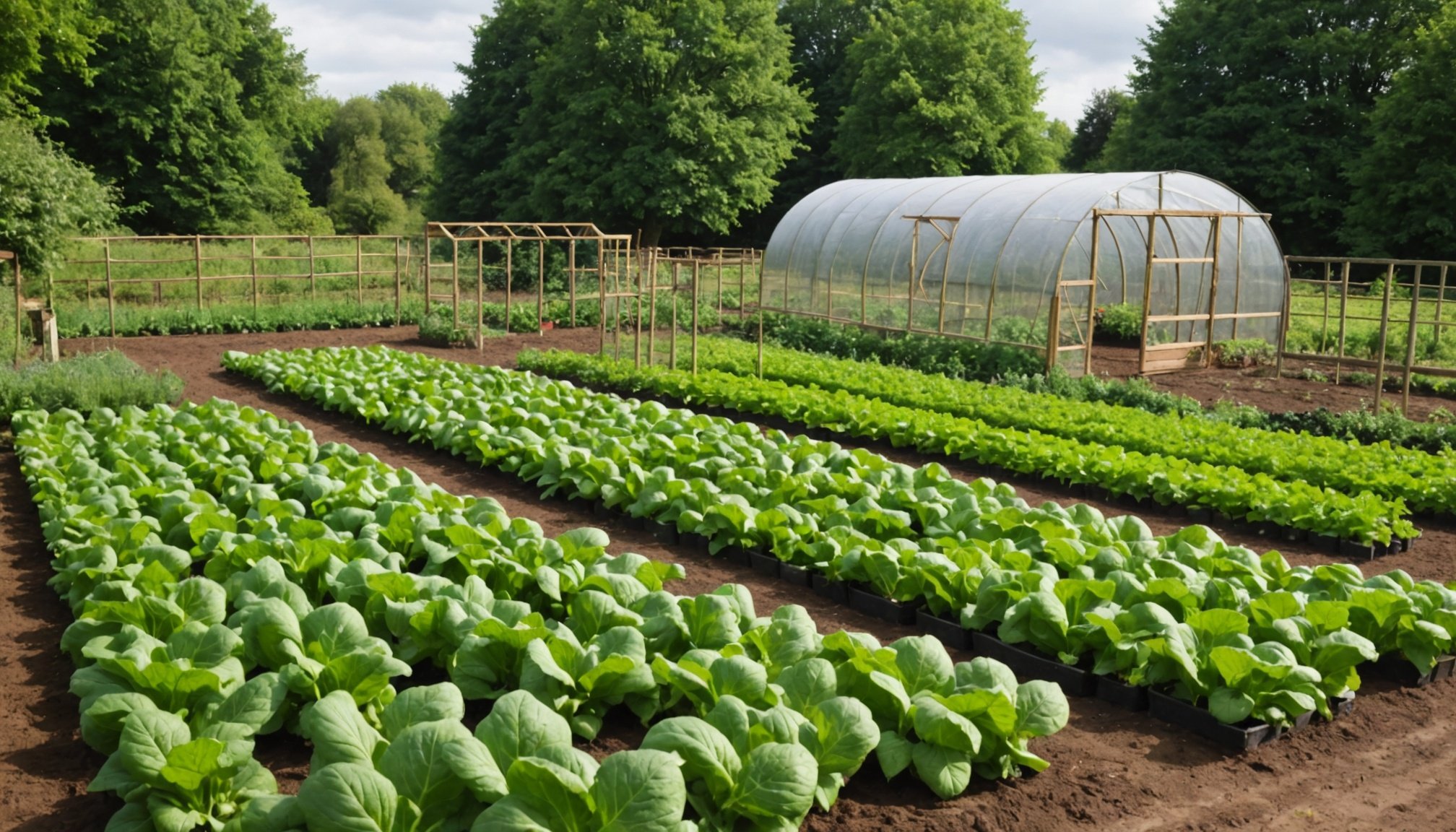Top Organic Fertilizers for Thriving Vegetable Gardens in the UK: A Comprehensive Guide
Why Organic Fertilizers are the Best Choice for Your Garden
When it comes to nurturing a vibrant and healthy vegetable garden, the choice of fertilizer is crucial. Organic fertilizers stand out as the preferred option for several reasons. Unlike chemical fertilizers, organic fertilizers work in harmony with the natural ecosystem of your garden, enhancing soil health, promoting sustainable growth, and ensuring the long-term viability of your soil.
“Fresh manure is organic matter that, when well-rotted, provides a rich source of nutrients for vegetable growing,” notes Charles Dowding, a renowned gardener and expert in organic gardening[1].
Also read : Top Plant Selections for Creating an Allergy-Friendly Urban Garden in the UK
Understanding the Basics of Organic Fertilizers
Before diving into the best organic fertilizers, it’s essential to understand what makes them effective.
Nutrient Content
Organic fertilizers typically contain a mix of nitrogen, phosphorus, and potassium (NPK), which are essential nutrients for plant growth. However, they often release these nutrients slowly, providing a sustained feed to the plants rather than a quick burst.
Also read : Top Plants for a Vibrant Year-Round Color Palette in UK Gardens
Soil Structure
Organic fertilizers help improve soil structure by adding organic matter, which enhances the soil’s water-holding capacity, aeration, and overall fertility. This is particularly beneficial in the UK’s varied climate, where soil health can be a significant factor in garden success.
Environmental Benefits
Using organic fertilizers reduces the risk of soil pollution and minimizes the impact on local ecosystems. They are also less likely to cause over-fertilization, which can harm plants and the environment.
Top Organic Fertilizers for Vegetable Gardens
Here are some of the best organic fertilizers you can use in your vegetable garden:
Compost
Compost is perhaps the most versatile and effective organic fertilizer. Made from decomposed organic matter, it is rich in essential nutrients and beneficial microorganisms that enhance soil health.
- How to Make Compost:
- Collect organic waste like vegetable peels, leaves, and grass clippings.
- Mix ‘green’ materials (high in nitrogen) with ‘brown’ materials (high in carbon).
- Keep the compost pile moist and aerated.
- Allow it to decompose for several months.
“Compost and well-rotted manure were always used in larger amounts for vegetable growing before the advent of chemical fertilizers,” highlights Charles Dowding[1].
Well-Rotted Manure
Manure from animals like cows, chickens, or horses is another excellent organic fertilizer. It must be well-rotted to avoid burning plant roots.
- Benefits:
- High in nitrogen and phosphorus.
- Improves soil structure.
- Supports beneficial microbial activity.
“Any manure needs to be well-rotted before being applied to beds, or added in the fall ahead of planting vegetables in spring,” advises Tammy Sons, an experienced horticulturist[4].
Bone Meal
Bone meal is a slow-release fertilizer rich in nitrogen, phosphorus, and calcium. It is particularly beneficial for plants that require a steady supply of these nutrients.
- How to Use:
- Mix bone meal into the soil before planting.
- Use as a side dressing during the growing season.
“Bone meal is an organic fertilizer rich in nitrogen, phosphorus, and calcium, and can be beneficial when growing leeks,” notes an expert from Homes and Gardens[4].
Blood Meal
Blood meal is a high-nitrogen fertilizer made from dried animal blood. It is ideal for plants that require a boost of nitrogen during their growth cycle.
- Benefits:
- Quick release of nitrogen.
- Promotes leafy growth.
- Can be used as a side dressing.
“Blood meal is a natural source of readily available nitrogen with a 12-0-0 formulation,” explains Tammy Sons[4].
Fish Emulsion
Fish emulsion is a liquid fertilizer made from the remains of fish. It is rich in nitrogen, phosphorus, and potassium, and also contains beneficial trace elements.
- How to Use:
- Dilute the emulsion with water according to the manufacturer’s instructions.
- Apply every 3-4 weeks during the growing season.
“Fish emulsion is a faster-acting fertilizer that provides a quick dose of nutrients but leaches quickly from the soil,” notes an expert from Homes and Gardens[4].
Comparative Table of Organic Fertilizers
Here is a comparative table to help you choose the best organic fertilizer for your vegetable garden:
| Fertilizer | NPK Ratio | Release Type | Benefits | Use |
|---|---|---|---|---|
| Compost | Variable | Slow Release | Improves soil structure, rich in beneficial microorganisms | Mix into soil before planting or as a top dressing |
| Well-Rotted Manure | Variable | Slow Release | High in nitrogen and phosphorus, improves soil structure | Mix into soil before planting or add in the fall |
| Bone Meal | 3-15-0 | Slow Release | Rich in nitrogen, phosphorus, and calcium | Mix into soil before planting or use as a side dressing |
| Blood Meal | 12-0-0 | Quick Release | High in nitrogen, promotes leafy growth | Use as a side dressing during the growing season |
| Fish Emulsion | 5-1-1 | Quick Release | Rich in nitrogen, phosphorus, and potassium, contains beneficial trace elements | Dilute with water and apply every 3-4 weeks |
How to Use Organic Fertilizers Effectively
Using organic fertilizers effectively involves understanding the specific needs of your plants and the timing of application.
Timing of Application
For vegetables like leeks, it is crucial to fertilize at two key moments: once before planting and once during active growth.
” We fertilize our leeks twice during the growing season: once when planted and once during active growth,” advises Tammy Sons[4].
Soil Preparation
Before applying any fertilizer, ensure your soil is well-prepared. This includes adding compost or well-rotted manure to improve soil structure and fertility.
Balanced Feeding
Understand the NPK ratio of your fertilizer and ensure it matches the needs of your plants. For example, leeks benefit from high-nitrogen fertilizers during their growth cycle.
Practical Tips for Gardeners
Here are some practical tips to make the most out of your organic fertilizers:
- Compost Tea: Make a compost tea by steeping compost in water. This liquid feed is rich in beneficial microorganisms and can be used to feed plants regularly.
- Soil Testing: Regularly test your soil to determine its nutrient levels and pH. This will help you choose the right fertilizer and avoid over-fertilization.
- Water Wisely: Organic fertilizers work best when the soil is moist. Ensure you water your plants adequately, especially after applying fertilizers.
- Combine Fertilizers: Sometimes, combining different types of organic fertilizers can provide a broader spectrum of nutrients. For example, using compost along with bone meal can offer both slow and quick release of nutrients.
Customer Reviews and Expert Insights
Here are some customer reviews and expert insights that highlight the effectiveness of these organic fertilizers:
- Compost: “Compost has been a game-changer for my garden. It’s improved the soil structure and fertility, and my plants are thriving,” says a gardener from Somerset.
- Bone Meal: “I’ve been using bone meal for my leeks, and the results are amazing. The plants are strong and healthy, and the yield is impressive,” notes Tammy Sons[4].
- Fish Emulsion: “Fish emulsion is so easy to use and provides quick results. My plants look healthier and more vibrant since I started using it,” says a customer review on Amazon[4].
Choosing the right organic fertilizer is a critical step in creating a thriving vegetable garden. By understanding the different types of organic fertilizers, their benefits, and how to use them effectively, you can ensure your plants receive the nutrients they need to grow healthily and sustainably.
Remember, organic gardening is about working with nature, not against it. By adopting these practices, you not only improve your garden’s health but also contribute to a more environmentally friendly approach to gardening.
As Charles Dowding aptly puts it, “The main focus of my adult life has been to grow healthy and health-giving food. Organic fertilizers are a key part of this journey”[1].
Frequently Asked Questions (FAQs)
Many gardeners wonder about the use of organic fertilizers and their effectiveness in vegetable gardening. One common misconception is that organic fertilizers are less effective than chemical ones. In reality, while organic fertilizers may work more slowly, they enrich the soil with essential nutrients over time, promoting healthier plant growth in the long term.
Is it safe to use organic products in my edible garden? Absolutely. Organic fertilizers are derived from natural sources and do not contain synthetic chemicals. This means they are safe for both the environment and your family’s health when applied appropriately.
Gardening with organic fertilizers often raises concerns about their application and results. How much should I use? It’s essential to follow the product instructions and adjust according to your garden’s specific needs. Some plants might require more nutrients, especially in nutrient-deficient soils.
Common concerns include the presence of pests or weeds, which organic fertilizers can help mitigate by improving plant health and resilience. Should issues persist, consider incorporating integrated pest management strategies.
Solutions for organic fertilizer use often involve selecting the right type for your plants, ensuring even distribution, and maintaining soil pH balance. For vegetable gardening, regular monitoring and adjusting can maximise the benefits of organic fertilizers, leading to a thriving and sustainable garden.
Conclusion and Additional Resources
Exploring the realm of organic gardening demands thoughtful research and continuous learning. To deepen your knowledge, consulting further reading and reputable gardening resources can be invaluable. Whether you’re a beginner or seasoned gardener, accessing expert advice can significantly enhance your gardening techniques.
For those seeking authoritative gardening resources, the Royal Horticultural Society (RHS) provides extensive articles, courses, and tips specific to organic gardening in the UK. Their insights cater to gardeners of all levels. Likewise, the BBC Gardening website offers practical guides and expert advice aimed at improving efficiency and sustainability in gardening practices.
Joining community resources can bridge knowledge gaps through shared experiences. Online platforms such as Gardeners’ World Forum and UK Gardening Forum allow you to connect with like-minded individuals to discuss trends, solutions, and innovations in organic gardening.
For ongoing learning, several books offer comprehensive approaches to organic gardening techniques. “The Organic Gardener’s Handbook of Natural Pest and Disease Control” is a recommended read for understanding eco-friendly pest solutions. Websites like Permaculture Association also host a wealth of information and workshops.
Remember, further reading and accessing a variety of expert advice can nurture a more fruitful organic gardening journey. Engage with these resources to cultivate not just your garden, but your knowledge.
Overview of Organic Fertilizers for Vegetable Gardening
The adoption of organic fertilizers in vegetable gardening ensures sustainable and eco-friendly growth. Unlike synthetic alternatives, these fertilizers are derived from natural sources and are composed of materials such as compost, manure, and bone meal. The primary advantage lies in their ability to enrich the soil with essential nutrients while boosting microbial activity, thereby improving plant health without harming the environment.
Utilising organic practices in vegetable gardening is crucial for several reasons. First, it minimises exposure to harmful chemicals, which can negatively impact not only the soil but also the surrounding ecosystems. Additionally, by fostering a natural balance within the garden, organic methods help promote biodiversity. Furthermore, gardeners often find that vegetables cultivated organically have richer flavours and improved nutritional profiles, making them appealing to consumers.
Several types of organic fertilizers are available on the UK market tailored for specific needs and conditions. For example, compost is an excellent all-purpose option that provides a broad spectrum of nutrients. Manure, on the other hand, is particularly rich in nitrogen, essential for leafy vegetable growth. Bone meal is known for its phosphorus content, which supports root development. By selecting the appropriate organic fertilizer, gardeners can cultivate thriving and resilient vegetable gardens.
Top 5 Organic Fertilizers for Vegetable Gardens in the UK
Organically growing vegetables requires thoughtful input for healthy yield. Here are gardening tips focusing on the best organic fertilizers suitable for the UK’s climates.
Fertilizer 1: Bone Meal
Bone Meal proves exceptional for vegetable growth due to its phosphorus-rich profile, which promotes robust root systems. It’s particularly effective for encouraging flowering and fruiting, crucial stages in a vegetable plant’s life cycle. Application methods involve incorporating it into the soil at planting time or during the growing season. Gardeners should apply it every four to six weeks, ensuring not to overuse, as excessive phosphorus can affect other essential nutrient uptakes.
User reviews consistently highlight improved vegetable size and overall plant vigor. An expert recommendation emphasizes a balanced approach, alternating with other nitrogen-rich fertilizers to maintain soil health. Bone Meal is particularly lauded for tomatoes and root crops like carrots and beets. This approach ensures plants receive requisite nutrients for enhanced growth and healthier produce. Embrace Bone Meal for your gardening regimen to witness substantial improvements in yield.
Considerations for Choosing Organic Fertilizers
When selecting fertilizers for your garden, particularly for vegetable gardening, several factors warrant attention to ensure optimal results. Primarily, understand your local soil conditions. An accurate soil test can reveal nutrient deficiencies, allowing you to choose an organic fertilizer that complements and improves soil health. For example, if your soil test indicates a lack of nitrogen, consider fertilizers high in nitrogen content.
Gardening advice often stresses the importance of soil pH. Different plants thrive in varying pH levels, and organic fertilizers can help balance the soil accordingly. For instance, vegetables like tomatoes prefer a slightly acidic to neutral pH. Adjusting your fertilizer choice to match pH needs can lead to more robust plant growth.
Climate plays a crucial role in how effective your fertilization efforts will be. In cooler climates, organic fertilizers may take longer to break down due to lower microbial activity. Conversely, in warmer climates, increased microbial activity can result in faster nutrient release. This means the same type and amount of fertilizer may behave differently under varied climatic conditions.
Ultimately, selecting the right fertilizer involves a combination of detailed knowledge of soil conditions and an understanding of the environmental factors influencing nutrient availability. Taking these aspects into consideration will enhance the efficacy of your fertilization efforts.
Application Methods for Organic Fertilizers
Applying fertilizers correctly can significantly enhance your gardening efforts. Utilising optimal fertilizer application methods ensures that plants receive essential nutrients efficiently.
Best Practices for Applying Fertilizers
It’s crucial to understand the timing and frequency of application. Fertilizers should be applied during the growing season when plants need nutrients the most. Regular applications every 4-6 weeks can be beneficial, but always refer to specific plant needs for accurate scheduling.
Techniques for even distribution are vital to ensure nutrients reach all parts of the plant. Using granulated fertilizers can facilitate even spread across the soil, while liquid forms offer precision targeting. To achieve an even spread, you can use a spreader or shake fertilizer gently over the area by hand, ensuring no clumps remain.
After application, appropriate watering and care post-application help activate fertilizers and reduce the risk of root burn. Watering immediately after application helps to integrate the nutrients into the soil, making them more accessible to the plants.
Advanced Application Techniques
Consider combining fertilizer with compost and mulching for enhanced results. This combination can improve soil structure, increase nutrient content, and retain moisture, leading to healthier plants.
Using liquid fertilizers provides a quick nutrient boost for plants needing immediate care. Dilute the fertilizer according to package instructions to avoid over-fertilization.
Foliar feeding delivers nutrients directly to the leaf surface and can be particularly beneficial for vegetables requiring a quick uptake. Ensure leaves are dry before application, and avoid the hottest parts of the day to minimize leaf burn.
Expert Tips and User Experiences
Embarking on a gardening journey can be deeply rewarding, yet it often comes with its own set of challenges. Drawing on gardening advice from seasoned gardeners in the UK can significantly enhance your knowledge and skills. Experienced horticulturists emphasise patience and consistency, especially when dealing with unpredictable British weather.
Insights from Experienced Gardeners
Many UK gardeners suggest layering organic matter in beds to improve soil health. This method, coupled with regular watering, fosters a rich growing environment. Engaging with local gardening communities can provide more region-specific expert tips, ensuring that your plants thrive regardless of climate variations.
User Reviews: Success Stories and Challenges
Enthusiastic users frequently share triumphs and hurdles they’ve encountered. One popular insight revolves around the strategic planting of companion plants to ward off pests naturally, reducing reliance on chemical treatments. Additionally, many users encourage experimentation with crop rotation to sustain soil nutrients.
Solutions for Common Challenges
Organic fertilization remains one of the more intricate aspects for garden enthusiasts. Some challenges include ensuring balanced nutrient distribution and preventing soil acidification. To tackle these, user reviews often recommend adopting a more diverse plant diet, incorporating compost, and testing soil pH regularly to maintain optimal conditions. These practical solutions also help in achieving sustainable gardening practices.
Visual Aids and Charts for Easy Reference
Visual tools are incredibly helpful for gardeners. They simplify complex information and assist in making informed decisions quickly and efficiently. Below, you’ll find various charts and guides that cover essential gardening topics.
Comparative Chart of Top Organic Fertilizers
Understanding the nutrient breakdown and application frequency of top organic fertilizers is crucial for effective gardening. The chart highlights:
- Nutrient Content: A comparison of nitrogen, phosphorus, and potassium (N-P-K) levels in different organic products.
- Application Frequency: How often each fertilizer should be used for optimal results.
- Effectiveness: Rated based on plant response and soil improvement.
Visual Guide to Application Techniques
A step-by-step image guide proves invaluable for both novice and experienced gardeners. It includes:
- Correct application methods for dry and liquid fertilizers.
- Infographic summaries capturing essential tips and common mistakes to avoid.
Soil Type Suitability Map
Soil characteristics vary considerably across the UK, impacting fertilizing choices. The soil type suitability map shows:
- Regional Variations: Differentiates between sandy, clay, loamy soils.
- Recommends ideal fertilizers for each soil type, ensuring maximum growth and sustainability.











